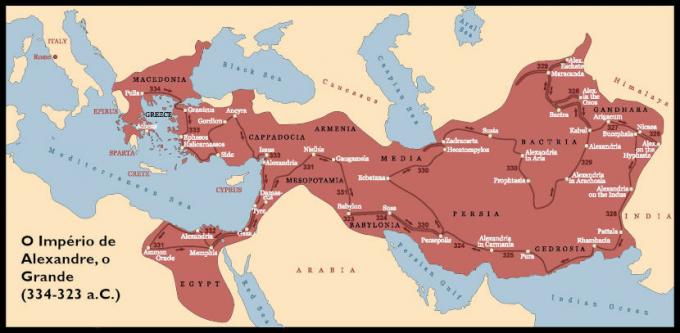Dona Carlota Joaquina de Bourbón was born on April 25, 1775, Infanta de España, the daughter of King Dom Carlos IV and his wife, Queen Maria Luisa de Parma. He learned languages, history, ...
Dom João VI, Prince Regent of Portugal, King of the United Kingdom of Portugal, Brazil and Algarves and, after 1825, King of Portugal. He was the son of D. Maria I, Queen of Portugal and King Dom Pedro III...
The 1967 Constitution was the 4th Brazilian Magna Carta and the third of the republican period. The Constitution, drawn up during the military regime, entered into force on March 15,...
Tiradentes Day is celebrated April 21 in Brazil since 1965, by Law No. 4,897. This date is a national holiday and pays homage to Tiradentes, considered a national hero, martyr and Patron...
Indian Day is celebrated on April 19 and was instituted in Brazil during the Vargas government. Schools, entities and various indigenous groups hold events in order to remember the importance of...
Tenentismo was a sociopolitical phenomenon from the beginning of the 1920s, when a political-military movement gained strength in barracks distributed throughout the national territory, where a series of...
Jânio Quadros was a politician and the 22nd president of Brazil from January 31, 1961 to August 25, 1961. He succeeded Juscelino Kubitschek (1902-1976). Besides, he was a teacher and...
A Jovem Guarda refers to the musical program shown on TV Record in São Paulo from 1965 to 1968, presented by Roberto Carlos, Erasmo Carlos and Wanderléia. The name of the program helped christen the...
Drugs from the sertão bring together the various types of spices (plants, roots, seeds, fruits, medicinal herbs, etc.) that were commercialized in Colonia Brazil (northeastern sertão) from the...
Brazil's participation in World War I was established in April 1917, after the Germans had sunk Brazilian ships. Six months later, Brazil declared war on the Empire...
The Treaty of Petrópolis was a diplomatic agreement between the Brazilian and Bolivian government, signed on November 17, 1903 in the city of Petrópolis, Rio de Janeiro, which annexed the territory of...
The West India Company, DutchWest-IndischeCompagnie, was a Dutch trading company, founded in 1621, with the aim of waging an economic war against Spain and Portugal. O...
The “Entradas e Bandeiras” were exploration expeditions with strategic and economic purposes, carried out in the interior of Brazil Colony between the 17th and 18th centuries. Indeed,...
Collor's Impeachment was the process of removal of President Fernando Collor de Mello, in 1992. Accused of involvement in corruption and financial fraud, there was great unrest in the streets...
The Praieira Revolution or Praieira Insurrection of Pernambuco represented an armed uprising of a liberal and republican character. Led by Pedro Ivo Veloso da Silveira, the revolt took place in...
Petrobras is the largest oil company in Brazil and one of the largest in the world. Its creation in 1953, under Getúlio Vargas, marked the 1950s. On October 3, 2013, the company...
The “War of Emboabas” was an armed dispute that took place between 1707 and 1709, for the right to explore the gold mines, recently discovered by the pioneers of São Paulo in the region of...
The arrival of the Portuguese in Brazil took place on April 22, 1500. On that day, navigators led by Pedro Álvares Cabral landed in the region of the current city of Porto Seguro. There...
The Lei do Ventre Livre or Lei Rio Branco (Law nº 2040) is considered the first abolitionist law in Brazil. It was presented by the Visconde do Rio Branco (1819-1880), of the Conservative Party, and...
The República da Espada (1889-1894) corresponds to the first period of the Old Republic, in which political power in Brazil was in the hands of the military. The presidents of this period were...
The history of Pernambuco is marked by conflicts between indigenous and Portuguese, Dutch domination and even an attempt at independence. Discover the story of one of the oldest...
Amnesty is the legal act in which political crimes committed within a certain period of time are forgotten. In Brazil, the 1979 Amnesty Law allowed the return of all accused...
The 1964 Military Coup was triggered on the night of March 31, with the deposition of President João Goulart. This action against a legally constituted government marked the beginning of the dictatorship...
Institutional Act No. 5 was published on December 13, 1968, signed by President Costa e Silva and marked the hardest phase of the period of military dictatorship in Brazil. The fuse for the...
The Sexagenarian Law or Saraiva-Cotegipe Law (n.º 3.270), corresponds to one of the Abolitionist Laws, alongside the Eusébio de Queirós Law, the Free Womb Law and the Áurea Law. It was promulgated day...
João Baptista Figueiredo (1918-1999) was the last general to be president during the period of dictatorship in Brazil from 1964-1985. He ruled between March 15, 1979 and March 15, 1985...
The “Bandeirantes”, also called “Sertanistas”, were the pioneer explorers to explore the Brazilian hinterlands, between the 16th and 18th centuries. As a rule, they were direct descendants...
The “discovery of Brazil” took place on April 22, 1500, with the arrival of the Portuguese in our country. Pedro Álvares Cabral, the brave Portuguese explorer, was coming with an expedition...
The Bill Aberdeen Act was enacted on August 8, 1845 by England outlawing the African slave trade. In this way, the British navy pursued, intercepted and imprisoned the ships...
The Constitutional (or Constitutionalist) government lasted from 1934 to 1937 and is considered the second stage of the Vargas era. The period begins with the promulgation of the 1934 Constitution and the election...
The Baron of Rio Branco was a Brazilian journalist, politician and diplomat. He was Brazil's Minister of Foreign Affairs from 1902-1912. He passed into Brazilian history for having resolved ...
Brazil, officially the Federative Republic of Brazil, is a country located in South America. It is considered the 5th country in territorial extension, owner of one of the greatest biodiversity of the...
Ernesto Geisel was a military man, politician and the 29th President of the Republic of Brazil. He ruled the country from 1974 to 1979. Biography Ernesto Beckmann Geisel was born on August 3...
The Cohen Plan was a supposed document attributed to the communists, which contained a project for the overthrow of the Getúlio Vargas government and the establishment of a communist regime in Brazil. THE...
The Beckman Revolt, of the Beckman or Bequimão Brothers, was a rebellion that took place in the city of São Luís, Province of Maranhão (which included the current territories of Maranhão, Ceará,...
Portuguese Africa comprises the territories that were colonized by the Portuguese during the 15th-16th century on the African continent. As a result of the overseas expansion, the...
The Additional Act of 1834 was a set of amendments introduced to the Constitution of 1824. Historical Context Members of the Trina Regency: Brigadier Francisco de Lima e Silva and the...
Father José de Anchieta, missionary of the Society of Jesus, also known as the apostle of Brazil, was distinguished by the fact that he participated in the beginning of catechization in lands...
The history of Brazil is the main theme of the Human Sciences and its Technologies test. Interpretive capacity, connections with Geography, Philosophy and Sociology and analysis from different sources...
Princess Isabel, Isabel de Bragança or Isabel do Brasil, was one of the most important female figures in the country's history. She was the first woman to administer Brazil, being Regent of the ...
The Dutch Invasions in Brazil were a series of incursions by the Republic of the United Provinces (Netherlands) during the 17th century. They took place in Bahia in 1624, in Pernambuco in the year 1630 and in the...
Presidentialism is a system of government created in the United States in 1787 to be used as a model in Democratic Republics. In it, each of the powers (Executive Power, Power...
João Goulart or Jango, as he became known, was the twenty-fourth President of the Republic of Brazil. He assumed the presidency of the country, with the resignation of Jânio Quadros, governing Brazil from...
Ação Integralista Brasileira (AIB) was a political organization created in 1932 by Plínio Salgado and was the first mass party in Brazil. Initially, they supported the Vargas government...
The Taubaté Agreement was a plan of state intervention in Brazilian coffee growing, which took place in February 1906, during the Rodrigues Ales government, whose objective was to promote...
The "Economic Stabilization Plan (PEE)" popularly known as the "Cruzado Plan", was a Brazilian economic plan created during the government of José Sarney in 1986, at the time...
The Iberian Union represented the union of the Iberian countries (Portugal and Spain) in the 1580 period, with the death of Dom Sebastião de Portugal, until 1640, the year of the Restoration Coup of...
José Bonifácio de Andrada e Silva was a Brazilian scientist, politician and statesman whose ideas and political influence were decisive for the independence of Brazil. José Bonifácio with the...
Antônio Conselheiro (1830-1897) was a religious leader and the founder of the Belo Monte camp, better known as Canudos. He was considered a religious fanatic at the time he lived, for this...
Dia do Fico is the date carried out by the regent of Brazil, Prince Dom Pedro, who decides to go against the orders of the Portuguese Courts and remain in Brazil. The event was named because,...


